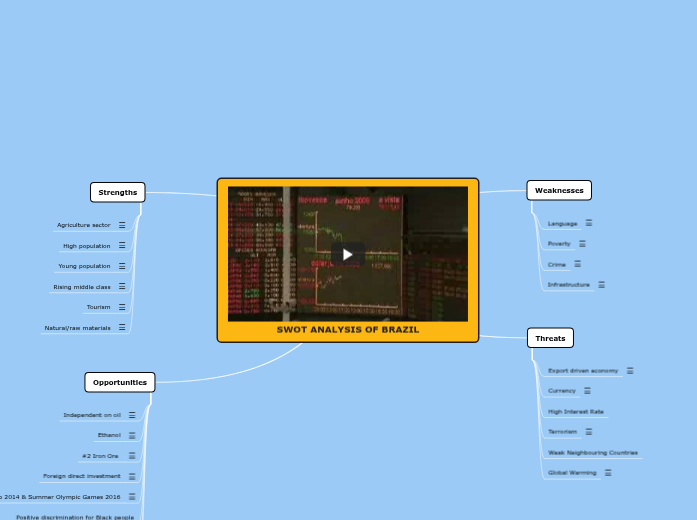SWOT ANALYSIS OF BRAZIL
Weaknesses
Language
Portuguese is not a mature trading language, and English is as a second language is not as good developed yet. Also all surroundings member speak Spanish.
Poverty
Poverty is still a big issue in Brazil - Definitions of poverty vary considerably among nations. For example, rich nations generally employ more generous standards of poverty than poor nations.
Crime
Brazil still has a high crime rate and gang violence in certain areas.
Infrastructure
The public transportation system and the infrastructure is not on a high standard in all areas yet, the world cup and the Olympic games gives hopes for changes.
Threats
Export driven economy
Exports helped to expand Brazil's economy, but they can rapidly change direction and slow Brazil's economy.
Currency
The Brazilian currency REAL is getting stronger, which could slow down there export driven economy
High Interest Rate
Terrorism
Guerilla activity especially in the Amazonas Region.
Weak Neighbouring Countries
Global Warming
As a consequence, global warming is considered to be the most acute threat to Brazil’s interests by the countries elites.69 Contrary to what its politicians would sometimes suggest, Brazilian elites strongly believe that Brazil needs to actively engage in tackling climate change, mostly by reducing the rate of destruction of the Amazon forest, the largest carbon sink in the world, 60 percent of which is on Brazilian territory.
Strengths
Agriculture sector
Brazil is one of the main agriculture products exporter in the world.
High population
Approximately 200 million. The Brazilian economy is the world's seventh largest by nominal GDP and the seventh largest by purchasing power parity, as of 2012. Brazil is one of the world's fastest growing major economies.
Young population
The median age in Brazil is 29.6, compared to 37.1 in USA and 41.2 in Canada. More potential for education, a larger market for consumer goods, and a larger tax base for the country.
Rising middle class
The core consumers of any population, the middle class, are rising in number – as of 2011 there were more cell phones registered than the population of the country.
Tourism
Tourism is becoming a major industry in Brazil, particularly as the 2014 FIFA World Cup. Rio de Janeiro and São Paulo are two of the most visited destinations in the country, offering visitors (whether in the country on business or pleasure) a fabulous peek into the complex heritage and natural spectacle of Brazil.Brazil is the most visited country in the continent of South America today.The main natural attractions in Brazil are:• The Amazon Jungle• The Amazon River• The many other rainforests of this tropical and subtropical region• The extensive beaches and bays that line the coast• The many unique and fascinating plant and animal species in Brazil
Natural/raw materials
Gold, Timber, Iron Ore, Uranium, Petroleum, Copper, Manganese.
Opportunities
Independent on oil
Brazil is one of the few countries in the world that are self-sufficient in oil, which plays a very crucial role in global economy.
Ethanol
It produces more ethanol than the combined production of Asia and Europe.
#2 Iron Ore
Second largest producer of iron ore in the world.
Foreign direct investment
The purchase of Brazilian land has become an increasingly popular investment strategy.
Soccer World Cup 2014 & Summer Olympic Games 2016
The 2014 World Cup and 2016 Olympics are taking place in Brazil which is a huge opportunity for the Brazilian economy.
Positive discrimination for Black people
Peak oil supply
The peak of increasing oil supply, according to the International Energy Agency (IEA), will happen some time around the 2020 to 2030. This could increase the demand for oil extracting companies and peripheral technology that can find oil in more difficult locations.The Brazilian government is spending $174 billion over the next few years.
Agriculture
Opportunity in agriculture, with soil so rich that almost any crop will grow, Brazil is potentially one of the world's greatest agricultural nations. It exports cognac, champagne and wine to Argentina, the U.S. and Europe—including 30 million liters last year to France. It is the world's No. 1 producer and exporter of coffee, ranks seventh in soybeans and rice; sixth in tomatoes, sweet potatoes and peanuts; fifth in jute; fourth in tobacco and cotton; second in sisal, cane sugar, cacao, corn, oranges.
